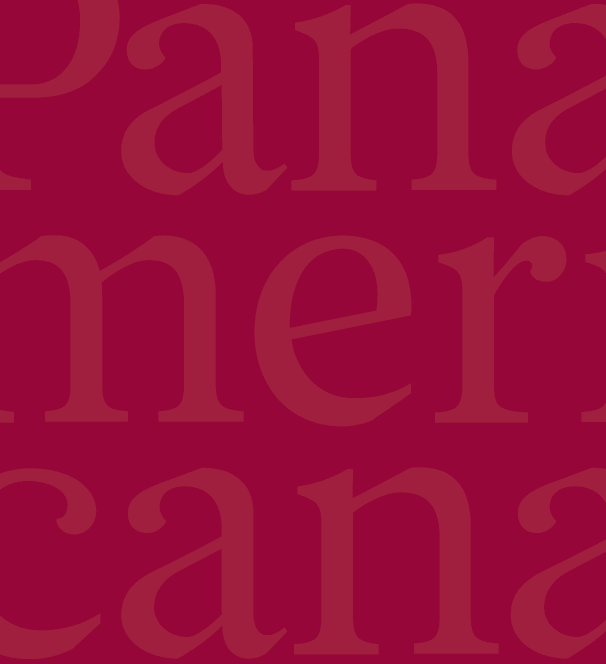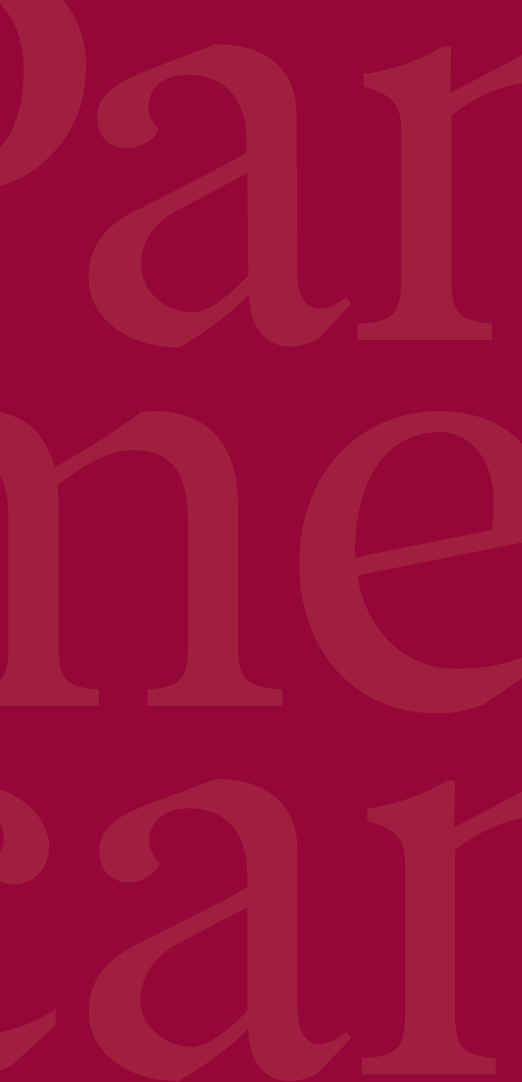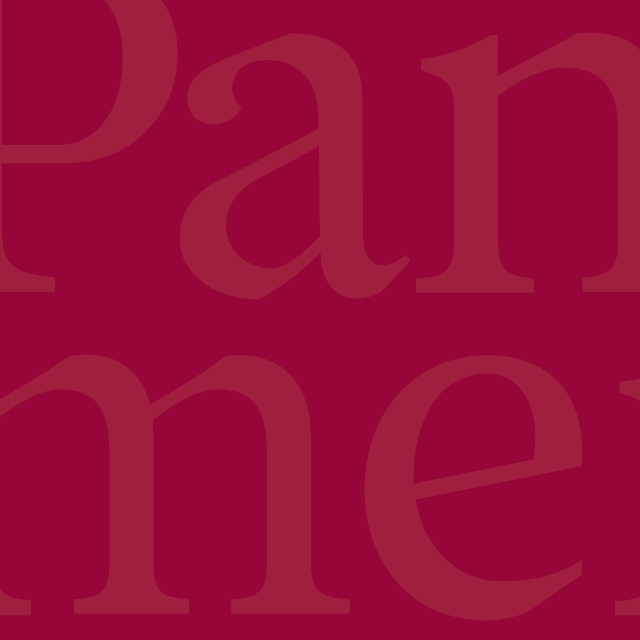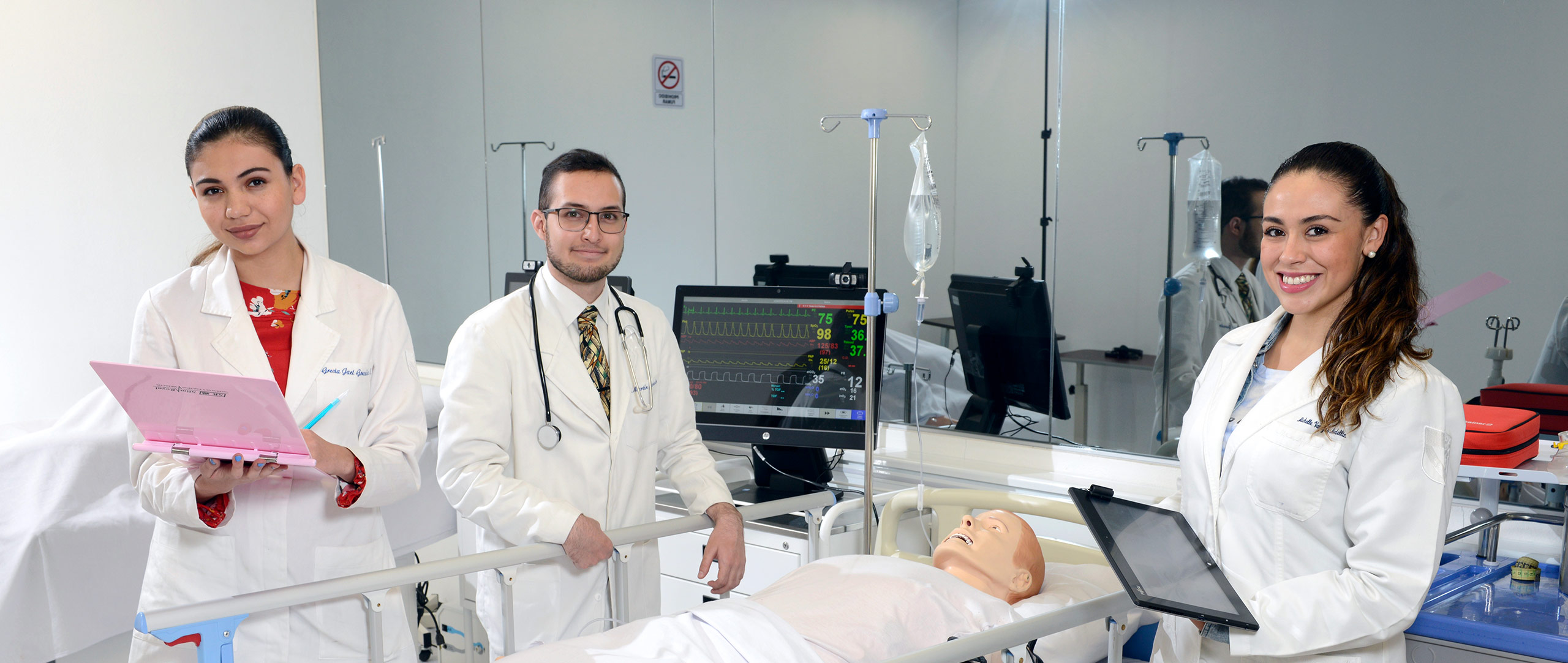
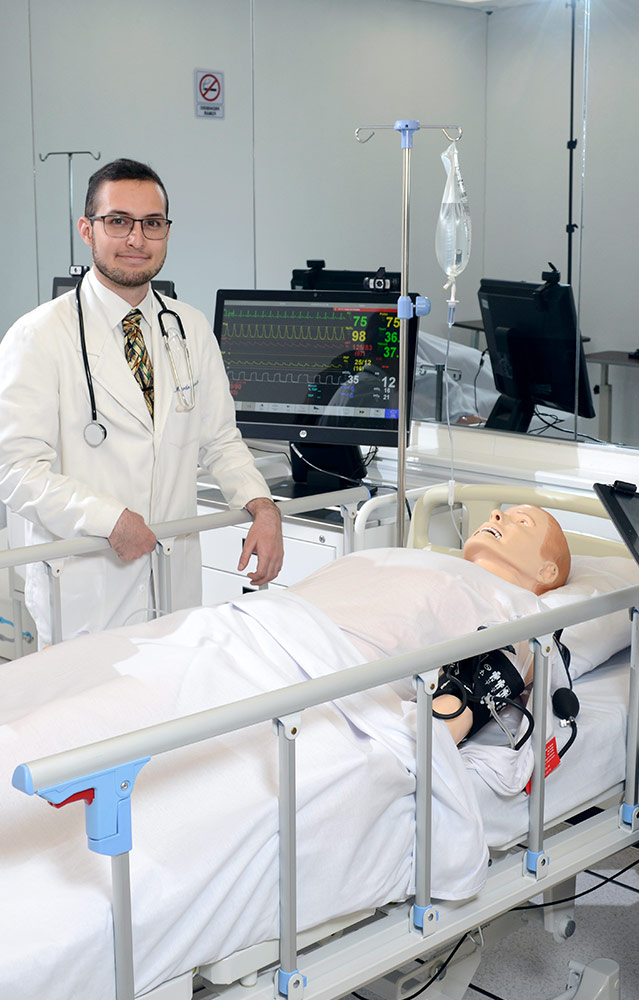
School of Medicine
In July 1996, the School of Medicine opened its doors and since its foundation it has redefined medical education by integrating the best of tradition, strategic innovation and research into its curriculum. This guarantees the student a comprehensive and high-level academic training, as well as the necessary tools to provide quality care to patients.
The semester curriculum is reviewed and updated every five years to keep pace with the continuous advances in medicine. Its main features are:
- Updating the thematic content of the subjects.
- Appropriate sequencing of subjects for the learning process.
- Emphasis on the development of self-learning skills.
- Development of medical skills with high technical efficiency and a focus on patient safety.
- Evidence-based medicine for decision-making.
- Integration of basic and clinical sciences from the first semester, through the Integration Seminars course.
- High quality electives.
- Bioethics.
- Health services administration courses.
- Medical English.
- Development of research projects during the degree course.
- Practice in learning scenarios with graded clinical challenges in the Simulation Center.
- Clinic.
The generation of new medical knowledge is fundamental. For this reason, the syllabus provides for our students to develop, over three semesters, a research protocol under the guidance of an experienced researcher, whether in basic, clinical or epidemiological research.
The School of Medicine's academic program is again accredited for the period 2018-2023 by the Mexican Council for the Accreditation of Medical Education (COMAEM).
Our Clinical Rotations are as follows:
NATIONAL
ABC Medical Center, Médica Sur, Centro Médico Dalinde, Hospital San Ángel Inn, Universidad Hospital Infantil de México, Federico Gómez, INPER, Cruz Roja Mexicana.
INTERNATIONAL
Northwestern Memorial Hospital (Chicago), Jackson Memorial Hospital (Miami), Clínica Universitaria de Navarra (Pamplona), Hôpital Lyon Sud (Lyon) and Hospital La Paz (Madrid).
MISSION
To train physicians who are distinguished not only for their solid professional competencies in health care, specialty and research, but also for their human quality, deep ethical sense and social responsibility.
The mission of training physicians involves the development of medical competencies. That is, the integration of scientific, technical, humanistic, bioethical, ethical and social skills that characterize the profession, for which a comprehensive educational model is applied.
The graduate of the School of Medicine of the Universidad Panamericana must meet the profile of a general practitioner trained for quality medical care. However, since its creation, the School of Medicine has also distinguished itself by focusing on specialization and research. Likewise, social responsibility is encouraged in order to respond to the health needs of the community. Thus, the graduate contributes to the health care system and to global health, and is accountable to society for his or her role.
VISION
To be an institution of reference in the training of physicians with the highest scientific, professional, human and ethical standards, as well as in the generation of knowledge through research. Contributing in this way, to respond to the health needs of the community, effectively improving the quality of health systems and patient care at all social levels.
RVOE
SEP 962060 dated 5/15/1996, plan 2018, school-based modality, Augusto Rodín site.
ENTRY PROFILE
An applicant to the Bachelor of Medical Surgeon's Degree at Universidad Panamericana should have the following characteristics:
- Vocation for medicine.
- Tenacity to face the challenges of medicine.
- Intellectual curiosity.
- Study habits.
- Critical capacity and interest in research.
- Respect for human life.
- Sense of responsibility.
- Emotional stability.
- Social commitment.
- Spirit of service.
GRADUATE PROFILE
A graduate as a Medical Surgeon at Universidad Panamericana possesses:
- Professional overview of medicine (clinical, research, teaching and administration).
- Academic excellence.
- International vision of the profession.
- Competences for any area of medicine.
- International recognition.
FIRST SEMESTER
- Anatomy I
- Developmental Biology
- Cell and Tissue Biology
- Public Health
- History of Culture
- Introduction to Health Systems and Technologies
- Integration Seminar I
SECOND SEMESTER
- Anatomy II
- Biochemistry
- Physiology I
- Medical Psychology
- Person and Society
- Integration Seminar II
- Elective I
THIRD SEMESTER
- Introduction to Clinical Practice
- Pharmacology I
- Physiology II
- Microbiology and Parasitology
- Immunology
- Surgery I
- Biostatistics
- Ethics
- Integration Seminar III
FOURTH SEMESTER
- Pharmacology II
- Surgery II
- Pathophysiology and Propedeutics
- Pathology I
- Imaging
- Electrocardiography
- Theological Anthropology I
- Communication Skills
- Integration Seminar IV
- Elective II
FIFTH SEMESTER
- Internal Medicine I
- Medical Therapeutics I
- Pathology II
- Psychiatry I
- Clinical Epidemiology
- Molecular Biology and Genomic Medicine
- Theological Anthropology II
SIXTH SEMESTER
- Internal Medicine II
- Medical Therapeutics II
- Pathology III
- Psychiatry II
- Bioethics I
- Clinical Genetics
- Medical Rehabilitation
- Research Project I
- Elective III
SEVENTH SEMESTER
- Surgery III
- Otorhinolaryngology
- Ophthalmology
- Psychiatry III
- Geriatrics I
- Social and Preventive Medicine
- Bioethics II
- Research Project II
- Health Services Administration I
- Regulatory Aspects of Medical Practice
- Responsible Procreation
EIGHTH SEMESTER
- Pediatrics
- Gynecology and Obstetrics
- Geriatrics II
- Forensic Medicine
- Palliative Care
- History and Philosophy of Medicine
- Bioethics III
- Research Project III
- Health Services Administration II
- Nutrition
- Medical and Surgical Emergencies
- Elective IV
NINTH SEMESTER
- Internship I
TENTH SEMESTER
- Internship II
OPTIONAL
- Data Analysis and Visualization in Medicine
- Apprenticeship in Medicine
- Advances in Genomic Medicine
- Chemical and Organic Basis of Biochemistry
- Quality in Health Services
- Laparoscopic Surgery
- Pain Clinic
- Diagnosis and Treatment of Burns
- Teaching in Medicine
- Clinical Pharmacology
- Philosophy and Medicine
- Medical English
- Oncologic Immunology
- Research I
- Research II
- Research III
- Research IV
- Research V
- Research VI
- Research VII
- Research VIII
- Wound Management
- Stress Management
- Sleep Medicine
- Travel Medicine
- Integrative Medicine
- Medicine and Complexity
- Mathematical and Probabilistic Models in Medicine
- Neurorehabilitation
- Spelling, Medical Writing and Public Speaking
- Selected Bioethical Issues Seminar
- Seminar Selected Biomedical Topics
- Selected Clinical Topics Seminar
- Selected Sociomedical Topics Seminar
- Anatomy Techniques
- Nursing Techniques
- Techniques and Procedures in Medicine
- Selected Topics in Nutrition and Sports Medicine
- Selected Topics in Medical Oncology
- Selected Topics in Pediatrics
- Selected Topics in Radiology
- Selected Topics in Clinical Simulation I
- Selected Topics in Clinical Simulation II
- Advanced Topics in Histology
- Advanced Topics in Basic Sciences
- Advanced Topics in Bioethical Sciences
- Advanced Topics in Clinical Sciences
- Topics in Hematology I
- Topics in Hematology II
- Topics of Psychology in Medicine
- Thanatology Topics
- Selected Topics in Prenatal Development
- Selected Topics in Clinical Epidemiology
- Clinical Toxicology
- Organ Transplants
- Language: English as a foreign language
CURRICULUM MAP
Learn more about our admission process by clicking here
Admissions
